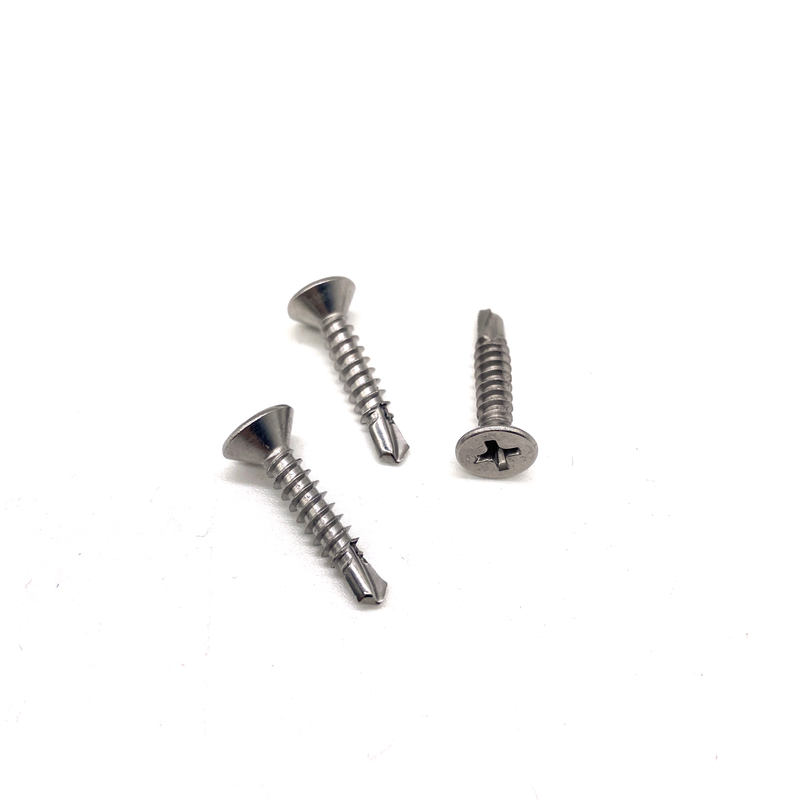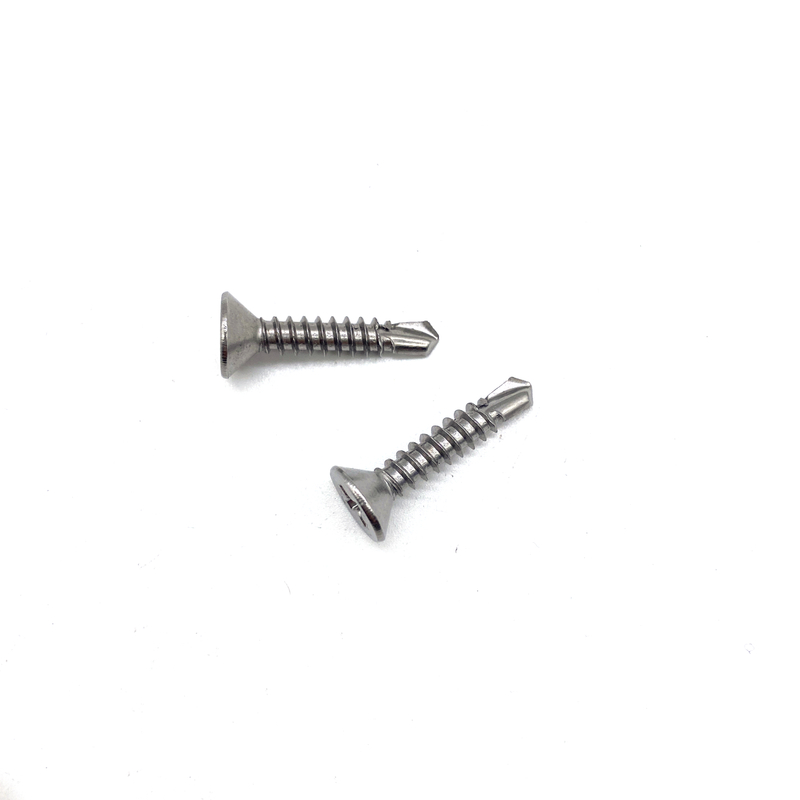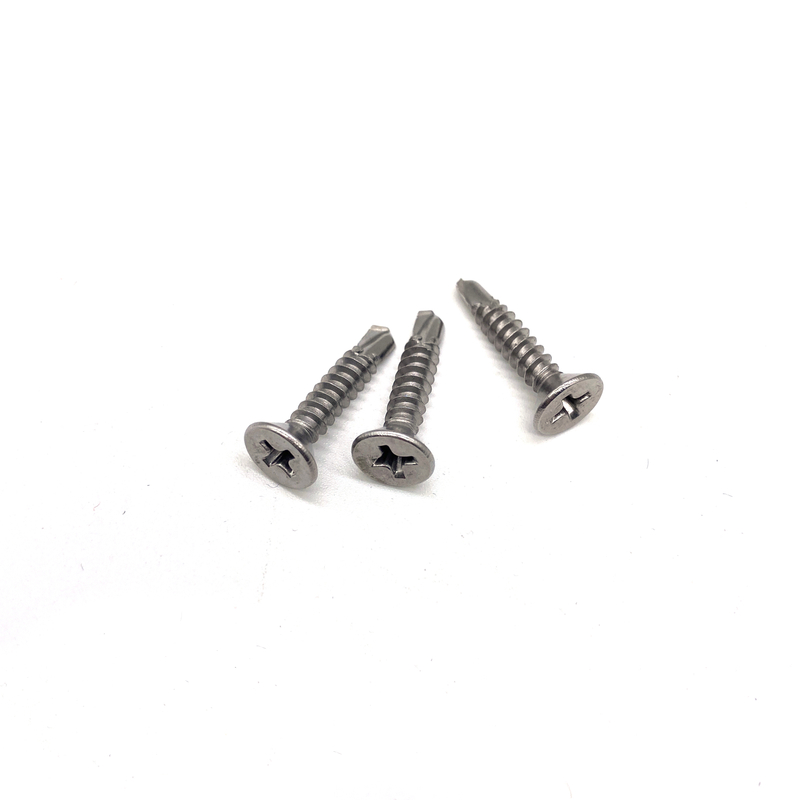- All
- Product Name
- Product Keyword
- Product Model
- Product Summary
- Product Description
- Multi Field Search
| Availability: | |
|---|---|
| Quantity: | |






DIN7504P
HINA
HINA2025011002
Definition:
A stainless steel countersunk cross slot self-drilling screw (DIN 7504P) is a type of fastener designed to drill into materials without the need for a pilot hole. It features a countersunk head, a cross (Phillips) drive, and a self-drilling tip. This screw is made from stainless steel to provide superior corrosion resistance, ensuring longevity even in harsh environments.
Characteristics:
Stainless Steel Material: The screw is made from stainless steel, offering high resistance to corrosion, rust, and staining. It is ideal for outdoor applications or environments exposed to moisture, chemicals, or high temperatures.
Countersunk Head: The countersunk design allows the screw's head to sit flush with the surface of the material, providing a smooth, aesthetically pleasing finish. This is especially important in applications where a sleek appearance is needed or when the screw needs to be hidden.
Cross Slot Drive (Phillips): The cross-slot drive allows for better torque transmission during installation. It helps in reducing the likelihood of cam-out (slipping), making it easier to tighten or remove the screw, especially in high-torque applications.
Self-Drilling Tip: The screw's drill-shaped point eliminates the need for a pilot hole, making installation quicker and easier. The self-drilling tip allows the screw to penetrate materials such as metal, wood, plastic, and composites.
High Load-Bearing Capacity: Stainless steel screws offer high tensile strength, making them suitable for heavy-duty applications where strong fastening is required.
Applications:
Construction: Commonly used for fastening roofing, cladding, and siding in both residential and commercial construction. The countersunk head ensures a clean finish, and the self-drilling feature saves installation time.
Automotive and Transportation: Used in securing parts in vehicles, trailers, or boats. Stainless steel's corrosion resistance is especially important for these applications, where exposure to moisture is frequent.
Metalworking: Ideal for securing sheet metal or other metal surfaces, particularly when drilling into thin materials like metal sheets and panels.
Electrical and Electronics: Common in the assembly of electronic equipment, machinery, and appliances where secure and flush fastening is essential.
Outdoor and Marine Applications: Due to its resistance to corrosion, this type of screw is widely used in marine and outdoor environments, such as securing parts in boats, fences, and other exposed structures.
In summary, DIN 7504P stainless steel countersunk cross slot self-drilling screws are versatile, durable, and efficient, making them ideal for a range of applications where ease of installation and resistance to corrosion are crucial.
Our service
Professional Manufacturer : All of our Fastener are designed and manufactured according to buyers'specification and performance.
Quality is guaranteed : Durability testing and critical technical design to enhance fasteners lifetime.
Cost effective : Wide range of parts selection , Competitive prices with professional factory supply.
Customized ideal Fasteners : customized services according to the samples and drawing offered.
Certification
Through scientific management, Jiaxing Haina fastener Ltd company has been obtained ISO9000 certificate of Quality Managerment System, SGS and BV international certificate system of Make in China.
What is the difference between a self-drilling screw and a regular screw?
A self-drilling screw has a pointed tip that enables it to create its own hole, while a regular screw requires a pre-drilled hole to be driven into the material.
Can stainless steel self-drilling screws be used outdoors?
Yes, stainless steel screws are highly resistant to corrosion, making them ideal for outdoor use in harsh environments, including marine applications.
What are the common sizes for stainless steel self-drilling screws?
Stainless steel self-drilling screws typically come in sizes ranging from #4 to #14, with lengths from 1/2 inch to several inches, depending on the application.
Definition:
A stainless steel countersunk cross slot self-drilling screw (DIN 7504P) is a type of fastener designed to drill into materials without the need for a pilot hole. It features a countersunk head, a cross (Phillips) drive, and a self-drilling tip. This screw is made from stainless steel to provide superior corrosion resistance, ensuring longevity even in harsh environments.
Characteristics:
Stainless Steel Material: The screw is made from stainless steel, offering high resistance to corrosion, rust, and staining. It is ideal for outdoor applications or environments exposed to moisture, chemicals, or high temperatures.
Countersunk Head: The countersunk design allows the screw's head to sit flush with the surface of the material, providing a smooth, aesthetically pleasing finish. This is especially important in applications where a sleek appearance is needed or when the screw needs to be hidden.
Cross Slot Drive (Phillips): The cross-slot drive allows for better torque transmission during installation. It helps in reducing the likelihood of cam-out (slipping), making it easier to tighten or remove the screw, especially in high-torque applications.
Self-Drilling Tip: The screw's drill-shaped point eliminates the need for a pilot hole, making installation quicker and easier. The self-drilling tip allows the screw to penetrate materials such as metal, wood, plastic, and composites.
High Load-Bearing Capacity: Stainless steel screws offer high tensile strength, making them suitable for heavy-duty applications where strong fastening is required.
Applications:
Construction: Commonly used for fastening roofing, cladding, and siding in both residential and commercial construction. The countersunk head ensures a clean finish, and the self-drilling feature saves installation time.
Automotive and Transportation: Used in securing parts in vehicles, trailers, or boats. Stainless steel's corrosion resistance is especially important for these applications, where exposure to moisture is frequent.
Metalworking: Ideal for securing sheet metal or other metal surfaces, particularly when drilling into thin materials like metal sheets and panels.
Electrical and Electronics: Common in the assembly of electronic equipment, machinery, and appliances where secure and flush fastening is essential.
Outdoor and Marine Applications: Due to its resistance to corrosion, this type of screw is widely used in marine and outdoor environments, such as securing parts in boats, fences, and other exposed structures.
In summary, DIN 7504P stainless steel countersunk cross slot self-drilling screws are versatile, durable, and efficient, making them ideal for a range of applications where ease of installation and resistance to corrosion are crucial.
Our service
Professional Manufacturer : All of our Fastener are designed and manufactured according to buyers'specification and performance.
Quality is guaranteed : Durability testing and critical technical design to enhance fasteners lifetime.
Cost effective : Wide range of parts selection , Competitive prices with professional factory supply.
Customized ideal Fasteners : customized services according to the samples and drawing offered.
Certification
Through scientific management, Jiaxing Haina fastener Ltd company has been obtained ISO9000 certificate of Quality Managerment System, SGS and BV international certificate system of Make in China.
What is the difference between a self-drilling screw and a regular screw?
A self-drilling screw has a pointed tip that enables it to create its own hole, while a regular screw requires a pre-drilled hole to be driven into the material.
Can stainless steel self-drilling screws be used outdoors?
Yes, stainless steel screws are highly resistant to corrosion, making them ideal for outdoor use in harsh environments, including marine applications.
What are the common sizes for stainless steel self-drilling screws?
Stainless steel self-drilling screws typically come in sizes ranging from #4 to #14, with lengths from 1/2 inch to several inches, depending on the application.